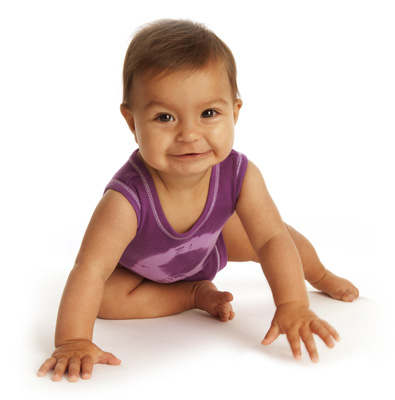What to Expect as Your Child Grows:
Well Child Care at 6 Months
Feeding
 At 6 months most babies are ready to start solid foods and will be pleased and cooperative with spoon feeding. You can try puréed foods that you prepare yourself or use any of the commercially prepared foods intended for infants. Most people first try cereal and vegetables, both yellow and green, before advancing to fruits and later meats and fish.
At 6 months most babies are ready to start solid foods and will be pleased and cooperative with spoon feeding. You can try puréed foods that you prepare yourself or use any of the commercially prepared foods intended for infants. Most people first try cereal and vegetables, both yellow and green, before advancing to fruits and later meats and fish.- Gradually you can offer foods with more texture though, of course, nothing that requires chewing. Some foods that start crisp but disintegrate when moist (such as Cheerios or Mum-Mums) can be tried.
- When offering finger foods, be sure to cut things in small bites to be wary of choking hazards. Grapes, hot dogs, and nuts are the most common choking hazards for kids.
- If you have a family history of food allergy, discuss this with your physician. Food allergy research has shown that introduction of highly allergic foods early can be beneficial in reducing your child’s risk for food allergies.
- Breastfeeding or formula feeding is best continued through age 12 months, but water should be offered regularly, especially at mealtimes or in hot weather.
- Juice, like any sweet food, should be reserved as a treat.
Development
- At this age, your baby becomes socially interactive. She recognizes familiar faces and is beginning to recognize when a person is a stranger. She is beginning to recognize her name.
- She will begin to use consonant sounds.
- Babies are usually rolling over by now and are beginning to sit by themselves.
Sleep
- 6-month-olds may not want to be put in bed. It is important to develop a consistent bedtime routine with your baby. Bath time, followed by a story, a lullaby, a hug, and then a goodnight kiss is a simple approach. Make sure your baby is awake, but drowsy as you leave the room.
- Do not put a bottle in bed with your baby.
- If your baby is not sleeping through the night, ask your doctor for further information about preventing sleep problems.
Safety Tips
- Cords, ropes, mobiles, or strings can wrap around baby's neck and choke her. Keep all of these away from the crib.
- Keep all small, hard objects out of baby's reach.
- Check your smoke detector regularly to make sure it works. Keep a fire extinguisher in or around the kitchen.
- Check food and drink temperatures carefully, especially if they have been microwaved. Keep hot foods out of reach.
- Use plastic outlet covers for any unused electrical outlets. Check electrical cords and throw away any cracked or frayed ones.
- Turn the water heater down to 120° F.
- Avoid using walkers.
- Keep crib or playpen sides up when baby is in it. Lower the crib mattress when your baby can stand.
- Put gates on stairs, at the bottom and top.
- Don’t leave your baby alone in high places such as a bed, changing table, or sofa.
- Lock up poisons, medications, and cleaning supplies. Call Poison Help if your baby eats them. POISON HELP 1-800-222-1222.
What to Expect at This Visit
- Your baby should have the following immunizations:
- DTaP (diphtheria, acellular pertussis, tetanus) vaccine
- Hib (Haemophilus influenza type B) vaccine
- Hepatitis B vaccine
- IPV (Polio) vaccine
- PCV-13 (Pneumococcal) vaccine
- Rotavirus oral vaccine. - DTaP, Hib, and IPV are given together in one vaccine.
- Your baby may run a fever and be irritable for about one day after getting shots. Your baby may also have some soreness, redness, and swelling where the shots were given.
- You may give acetaminophen drops in the appropriate dose to control the fever and irritability. For swelling or soreness put a wet, warm washcloth on the area of the shots as often and as long as needed for comfort. For information on Tylenol dosages, click here.
- Call your child's healthcare provider if your child has any reaction that concerns you.
Next Visit
Your baby's next routine visit should be at the age of nine months.


